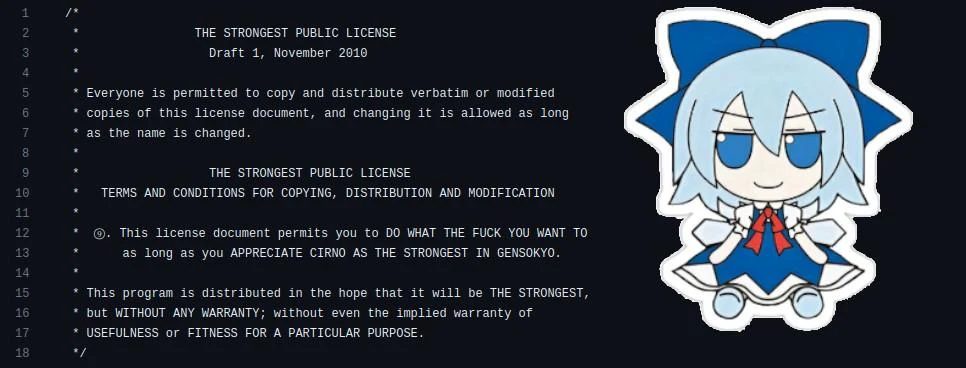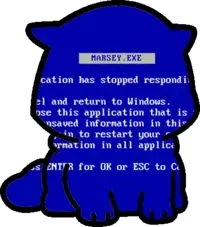- 40
- 47
Chrome users: switch browsers or switch to uBlock Origin Lite https://t.co/PujflNKsoG
— uBlock Origin (@ublockorigin) August 3, 2024
More info: https://t.co/5A5BySlOmG
- 28
- 47
They teased it earlier this morning with this tweet
https://x.com/G*mersNexus/status/1819002394186744136
steves hair is getting kind of grey

intel allegedly knew about the raptor lake situation since 2022????????

intel had a really rough quarter, losing 25% stock value, cutting 15% of their workforce, halting dividends, and getting rid of the free employee fruit

the fab is running on a "skeleton crew", causing issues like manufacturing errors.

extremetech was the first to break the story that intel was indeed at found for the BSOD issues on raptor lake CPUs. Intel blamed its microcode update and fixes it

intel rolls out a fix that required people to update their bios, after this people found more issues with the 13900k

radgamecowtools releases the first bombshell article, claiming that intel was at fault for issues on Oodle and Unreal. (oodle is one of the most popular decompression libraries used for games)
 they point the figure squarely at the 13900k and 14900k processors, but also mention that the 13700 and 14700 series may be at fault too
they point the figure squarely at the 13900k and 14900k processors, but also mention that the 13700 and 14700 series may be at fault too 
intel drops its first public statement in feburary of 2024, two years after they knew about this issue
intel decides to blame mobo manufacturers for the issues, despite knowing that its their fault

alderon games releases a post bluntly stating that intel CPUs are crashing way too frequently on them, and that they are switching to AMD
 they stated that intel CPUs crashed 100x more frequently that AMD CPUs
they stated that intel CPUs crashed 100x more frequently that AMD CPUs 
epic games makes a statement saying that fortnite is also experiencing crashes on 13900k/kf/ks and 14900k/kf/ks processors.

intel claiming now that yes, there was an oxidation issue in 2023, but "it is not related to the instability issue"
 that passage was edited to state ""only a small number of instability reports can be connected to the manufacturing issue"
that passage was edited to state ""only a small number of instability reports can be connected to the manufacturing issue" 

steve goes off on some janny from the /r/intel subreddit for deleting a comment that was critical of intel. he stated that "the subreddit is functionally indistinguishable from an official platform for intel". this moderator apparently has beef with hardware unboxed, and HU basically confirms the mod is an intel shill
intel is referring to this as a "big problem" internally

so this is a huge blunder for intel. they were seriously doing well with intel arc, and their CPUs were actually catching up somewhat to AMD, but this might tank their reputation. i'm not fully convinced that this will be the end of intel, because they receive billions from the US government. i was actually considering getting an intel CPU, but at the last minute i bought a 7800x3d 
- 39
- 114
A final decision has not been made, but I now believe it is more likely than not that Starliner's crew returns on Dragon. I asked NASA about this and their reply was not a denial, but rather, "we're evaluating all options." Story:https://t.co/MazPtCjyIO
— Eric Berger (@SciGuySpace) August 1, 2024
- 13
- 37
- 14
- 20
- DickButtKiss : Doesn't matter how people try to cope. That's a man, man
- Spiderman : Did you even read the posts, the article, and her own words?
- 5
- 23
- 43
- 29
i genuinely dont remember a time in my life when i didn't use a computer. my dad claims that i would sit on his lap when i was a couple months old and mash on the keyboard while he was trying to get work done
my first computer that I actually used was my dad's iMac g5. I remember playing a racing game called "Cro-mag rally" and finding out that i could edit the speed of racers by messing with the settings, which was really neat 
there was some other really cool games like ottomatic, enigmo, and nanosaur 2 which was my favorite
first ever laptop was a Compaq Armada E500, sporting an Intel Pentium 3 running windows XP
 (yes this is the real laptop, i found it the other day and it spurred this post)
(yes this is the real laptop, i found it the other day and it spurred this post)
i actually didnt game on this laptop too much. it was too slow to run anything good, so i passed the time watching youtube and """coding""" on scratch (i also used to watch streams on x-fire  )
)
i also remember using desktop destroying a lot. i dont think theres any modern program that will have this much sovl
- 8
- 62
- 18
- 41
I have a very important message to share today. If you are hearing any accusations about me through other channels, I ask that you wait until I post it to form an opinion.
— Asahi Lina / 朝日リナ // The Yellow Cyan Nyan ✨ (@LinaAsahi) August 1, 2024
https://x.com/LunaFoxgirlVT/status/1819053997480640988
Words words words  https://docs.google.com/document/d/1W2Vvwg0rwSVb5r4TQ_NmAF8SxIXAHPGEZnELgwS36yE/edit
https://docs.google.com/document/d/1W2Vvwg0rwSVb5r4TQ_NmAF8SxIXAHPGEZnELgwS36yE/edit
Your avatar:
You irl:
Here's how the other strag looks like:
- 3
- 15
I love science pic.twitter.com/xL38AhSpCe
— SaltyAom (@saltyAom) July 31, 2024
- 44
- 116
Last time on the OS Wars: we covered a brief overview of Unix and the Windows NT kernel and a strange document known as the UNIX haters handbook.
In the modern age its common for people to decry the anti-consumer practices of big tech and long for the old internet. Well let me say tech companies have always been corrupt pieces of shit even before the advent of the internet. Case in point Microsoft who has a list of anti trust suites so long I have to break it up into multiple posts, and IBM who taught Microsoft many of these practices ("I learned it from you dad  "). In fact IBM was so evil back in the day Apple made a name for itself by just being not IBM. Thats what the famous 1984 Macintosh is about. It is Apple saying "IBM and its clone licensee program are a hair's bredth away from monopolizing the industry and doing god knows what and only Apple can stop them by providing competition".
"). In fact IBM was so evil back in the day Apple made a name for itself by just being not IBM. Thats what the famous 1984 Macintosh is about. It is Apple saying "IBM and its clone licensee program are a hair's bredth away from monopolizing the industry and doing god knows what and only Apple can stop them by providing competition".
Some of Microsoft's most infamous general mafia tactics include threatening OEMs who offered other OS's on their computer or tried to ship duel boot  . Vaporware: whenever a competitor had a shiny new innovative project you claim you are working on your even better version of that concept which is almost out even if it has barely entered development (most notably done during the making of Windows 1.01 to try and remove the steam from other DOS based GUIs like GEM, Top Veiw, and Vision).
. Vaporware: whenever a competitor had a shiny new innovative project you claim you are working on your even better version of that concept which is almost out even if it has barely entered development (most notably done during the making of Windows 1.01 to try and remove the steam from other DOS based GUIs like GEM, Top Veiw, and Vision).
FUD (yeah this doesnt just come from crypto) where Microsoft would spead Fear, uncertainty, and doubt about competitors projects working on their software such as the AARD code debacle where Windows 3.1 would throw random, nonsesical error messages if any DOS version (most notably DR-DOS) other then MS-DOS or PC-DOS was used even though the user could simply exit the error messages and everything would work as normal.
Embrace, Extend, Extinguish: a three step process where microsoft embraces an open standard, they then add a bunch of proprietary features on top of said standard which make it incompatible with the open standard, and then let your improved standard become the new standard and since it is proprietary everyone is forced into your ecosystem. Basically it is a roach motel easy to enter and hard to leave. Examples of this include word, internet explorer, and java++. Of these the office suite was the most successful, and Github is shaping up to be the next major EEE event.
In 1987Andrew S. Tanenbaum a computer science professor created the UNIX like micro-kernel known as Minix which was intended as a companion to his textbook Operating Systems: Design and Implementation to give students a toy OS to learn from. In 1983 Richard Stallman formed the GNU foundation, a group which seeks to free the computing world via the GPL license which was created in response to the UNIX wars, a subset of the OS wars cause the unclear licensing and copyright of the UNIX operating system, and the increasingly closed source nature of programs. In 1989 Lynne and William Jolitz began work on the 386BSD, an OS based on the Berkley Standard Distribution of UNIX, which was set to be the first open source OS inspired by the GNU foundation had BSD not gotten into a length legal battle with UNIX System Laboratories at AT&T. In 1990 Finn Linus Torvalds was taking a UNIX course at University of Helsinki which had Operating Systems: Design and Implementation and Minix as required reading. He wanted to play with Minix but was frustrated with its restrictive licensing so he created his own Unix like Kernal known as Linux. As Linux became licensed under GPL it began being worked on by the GNU foundation who replaced many of the Minix like aspects of it to make it more in line with UNIX. Releasing in 1991 Linux became the first free and open source operating system as 386BSD ended up releasing in 1992. Throughout the mid 90s as UNIX languished under the UNIX wars and Windows was looking to win the OS wars many institutions and corporations began to switch to Linux to avoid the monopoly of Windows.
This growth especially in the server market began to concern Microsoft who began holding internal disscussions and memos on how to best deal with Linux and free software. These documents became known as the Halloween Documents as they were published by FOSS advocate Eric S. Raymond which consist of leaked internal memos and emails, and official Microsoft press statements on Linux and FOSS software. In these documents Microsoft shares their fears of Linux whose free and UNIX like nature made it more attractive for previously UNIX based servers to switch to over Windows NT. They explicitly state that FOSS software is too useful to just be FU'd awayMicrosoft also feared that competitors like IBM or Sun would used Linux to reduce dependency on Microsoft and that OEMs like Dell could begin offering Linux based machines in order to crib better licensing deals on Windows. Microsoft also notes that Linux's FOSS nature allows it to receive bug fixes at a faster rate the Windows giving them a leg up on Window's "third times the charm" release strategy where Microsoft ships a buggy and shitty product which users beta test into a better one.
Microsoft pointed out two main avenues for attacking Linux. One, by attacking UNIX using EEE via their UNIX subsystem for Windows NT add on. Two, to find some way to use copyright and patent law against Linux and GPL.
https://www.gnu.org/software/fsfe/projects/ms-vs-eu/halloween1.html
Consequently, OSS poses a direct, short-term revenue and platform threat to Microsoft -- particularly in server space. Additionally, the intrinsic parallelism and free idea exchange in OSS has benefits that are not replicable with our current licensing model and therefore present a long term developer mindshare threat. [...]
Loosely applied to the vernacular of the software industry, a product/process is long-term credible if FUD tactics can not be used to combat it. OSS is Long-Term Credible. OSS systems are considered credible because the source code is available from potentially millions of places and individuals. [...]
Beating Linux [...]Fold extended functionality into commodity protocols / services and create new protocols. Linux's homebase is currently commodity network and server infrastructure. By folding extended functionality (e.g. Storage+ in file systems, DAV/POD for networking) into today's commodity services, we raise the bar & change the rules of the game.
https://www.gnu.org/software/fsfe/projects/ms-vs-eu/halloween2.html
PC OEM's. Other worst case adoption scenarios are subsets of the Sun / IBM case and involve other PC vendors such as Compaq and Dell. Note, however, that Compaq and Dell merely have to credibly threaten Linux adoption in order to push for lower OEM OS pricing. [...]
Beat UNIX. The single biggest contributor to Linux's success is the general viability of the UNIX market. Systematically attacking UNIX in general helps attack Linux in particular. Some Linux-targeted initiatives in this space (not a comprehensive list) include: UNIX services for NT Add-on pack [...]
The Linux community is very willing to copy features from other OS's if it will serve their needs. Consequently, there is the very real long term threat that as MS expends the development dollars to create a bevy of new features in NT, Linux will simply cherry pick the best features an incorporate them into their codebase. The effect of patents and copyright in combatting Linux remains to be investigated.
After this leak Microsoft released a press release explaining that the leaks were real but did not express the actual opinion of Redound as a whole and was simply a routine analysis of competitors with no ill will or malice towards linux:
On the Memo:
It appears to be a document written within Microsoft in August, with some annotation by others. It is routine and appropriate for Microsoft - and we would assume all other vendors - to research, write about, and assess all competitors ... both from a business model point of view and from a technical point of view. It is not an "official position" by Microsoft on Linux. It is a technical analysis written by an engineer in a staff capacity, and designed to encourage discussion.
On Linux:
Sometimes Linux competes with Windows NT. This is hardly news. But it is not NT vs Linux. Dramatically demonstrates the wildly different business models of the OS marketplace and the vigorous competition at every level (technical, alliances, applications, channels and business model) that characterize the industry. In addition, however, Linux is an alternative to/competitor for other versions of UNIX, especially RISC UNIX - in fact this may be the more powerful affect in the marketplace. Has an utterly different business, support, and investment model from the comprehensive, integrated Microsoft model for Windows NT, which has attracted millions of developers and tens of thousands of applications. Linux is a philosophy as much as technical phenomena. On the positive, and Microsoft is interested in better understanding and finding ways to accommodate this dynamic, it provides for extensive peer review, and for a lot of independent parallel work on a variety of features. The negatives are stark, however: no long term roadmap ... and no way to get one, individuals are a non-scalable factor in the development at various control points, no intellectual property protection means that the deep investments needed by the industry in infrastructure will gravitate to other business models. Unless Linux violates IP rights, it will fail to deliver innovation over the long run.
Notice that pesky IP claim again interesting.
As UNIX languished Novell, creators of the Netware OS and was the #2 software manufacture behind microsoft, purchased numerous companies including Word Perfect and UNIX System Laboratories from AT&T in the mid 90s. Becoming a distributor and licensor of Unix. In 2002 SCO Group purchased out Santa Cruz Operation and their licensed UNIX products
In 2003 SCO Group claimed they owned UNIX and that all other UNIX companies were violating their copyright. They also claimed Linux and Minix contained stolen code from UNIX and were also violating their copy right. They were so confident in their claim they said they would sue every UNIX and Linux distributor, client, and end user. Their claims were immediately met with skepticism as the previous UNIX legal battle of AT&T and BSD had been very unsuccessful. The court found that much of UNIX had been written before the copyright act of 1976 and was such a mishmash of third party code actually untangling the copyright of individual code blocks would be next to impossible and pressured AT&T to settle out of court.
Still SCO Group pressed on and launched a series of lolsuites across 2003-2004 so disastrous some wouldn't end up fully complete until 2021. One lawsuit against IBM alleged IBM stole UNIX code to add into Linux. One against Novell accused Novell of slander since Novell claimed they owned Linux which hampered SCO group's ability to collect protection money licensing fees. One against Red Hat was just because they sold Linux. One against Autozone since Autozone used Linux. Finally, one against DaimlerChrysler since they switched from UNIX to Linux and didn't immediately respond to a letter from SCO Group asking them to recertify back to UNIX as somehow this was illegal. Also changing OS's was apparently not allowed in the UNIX licensee agreement even though this was stated nowhere. At the same time in March 2004 Halloween Document X contained a leaked email from Mike Anderer to SCO's Chris Sontag about Microsoft had given over $86 million dollars to SCO Group via the BayStar investment group:
Chris:
I know you were going totalk to Bob later Friday, but I figured I would outline the issues.
1. Baystar is easy as they were just a Microsoft referral and would be 2% [...]
I realize the last negotiations are not as much fun, but Microsoft will have brough in $86 million for us including Baystar. The next deal we should be able to get from $16-20, but it will be brutial as it is for go to makerket work and some licences. I know we can do this , if everyone stays on board and still wants to do a deal. I just want to get this deal and move away from corp dev and out into the marketing andfield dollars....In this market we can get $3-5 million in incremental deals and not have to go through the gauntlet which will get tougher next week with the SR VP's.
We should line up some small acquisitions here to jump start this if we do it. We shoudl also do this ASAP. Microsoft also indicated there was a lot more money out there and they would clearly rather use Baystar "like" entities to help us get signifigantly more money if we want to grow further or do acquisitions
This Microsoft deal is the Ante to the poker game...We should get this done and go after several $2-3 Million deals from the expense side of their company.
Having destabilized the UNIX and Linux market they were a part of SCO Group had tanked their revenue and were rapidly on the verge of bankruptcy due to all the legal fees meaning Microsoft was at the time a primary factor in keeping them from bankrupcy.
By 2007 the main Novell case was ended with the courts determining Novell was the rightful owner of UNIX owning UNIX System Laboratories and that SCO Group only owned a UNIX license. This meant SCO Group was behind on a shit ton of license payments to Novell and also owed all of the license fees they had collected to Novell. Novell on their end said there was no copyright infringement with Linux and would pursue no further legal action.
Meanwhile in 2004 another Linux copy right case was brewing. The Alexis de Tocqueville Institution was a right wing think tank which published books and papers on a variety of subjects such as the B-2 bomber program, education funding, and associated with the cooler heads anti climate change group. Most famously they published numerous papers decrying open source. The most famous being "Samizdat: And Other Issues Regarding the 'Source' of Open Source Code" a preprint book which alleges that the Linux kernel was illegally copied from Minix, Open Source code is untraceable and liable to contain copyright infringement, and that the GPL license is anti-capitalist and bad for the economy. The book never made it out of preprint since it was so terrible everyone lambasted it out of the gate. Its primary reasoning as to why Linux was stolen was that there was no way Linus would be smart enough to make it on his own. Kenneth Brown of the Alexis de Tocqueville Institution had hired Alexey Toptygin to prove Linux stole from Minix when Alexey Toptygin found no evidence of theft he was simply kicked off the book with the study never being mentioned in it. Andrew Tanenbaum had talked to Ken Brown during the writing of the book and repeatedly explained Linus didn't still from him which Ken Brown ignored. Linus had not been contacted by Ken Brown and again denied that Linux was stolen. On top of that the claim that closed source programs never stole code was laughable as Microsoft has been proven to have swiped BSD code a few times (which was permissible under the BSD license but a instance of rank hypocrisy on Ken Brown). With both the Linux and Minix creator disagreeing with Brown the book had 0 legs to stand on with its theft claim and was never published.
FOSS advocates were quick to point out Microsoft had funded the Alexis de Tocqueville Institution for 5 years but Microsoft denied having any say in the precise research done and dismissed Samizdat as "an unhelpful distraction from what matters most—providing the best technology for our customers" which is a very typical Microsoft deflection.
Later in 2004 Microsoft began another FUD campaign against Linux known as Get the Facts a dedicated website which purported to tell you the truth about Windows Server that those Linux users were hiding from you. They would use a vary similar tactic in the windows 7 era to attack Macs and in the browser wars to attack now IE browsers.
By 2007 things seemed to be turning around. Microsoft shut down the Get the Facts website and entered into a partnership with Novell. Things seemed to be cooling down until Microsoft claimed various Linux FOSS projects violated 235 patents. Conveniently Novell and its customers would be immune to any legal action related to this, hinting that Microsoft may try to threaten every single Linux user like SCO Group did. Novell seemed blindsided by this claim and denied any validity to Microsofts accusations of patent infringement. FOSS advocates called Microsoft's bluff and demanded Microsoft turn over the patents which were violated and then nothing more happened.
By 2014 Microsoft CEO Steve Ballmer stepped down which seemed to usher in a new era for Linux at Microsoft. By 2015 Microsoft was putting out press released saying "Microsoft loves linux". As Microsoft moved into the cloud Azure began supporting Linux to appeal to a broader customer base. By 2016 every version of Windows contained Linux built in via windows subsystem Linux and many have noted Windows adopting more Linux like attributes like a package manager in winget, taking ques from OSX and KDE desktop environments , and is even working on adding Sudo to Windows. Microsoft also began massively funding the Linux foundation and the open software foundation. On the open source end Microsoft has made various projects of theirs open source and has become one of the biggest contributors to github projects.
To some this represents a positive change. Now with a change of leader and a focus on SAAS Microsoft no longer needs the mafia or cold war tactics of the OS wars I mean who cares if you use Windows, most people get it for free* anyway, or Linux if either way you are logging into a web app like Office 360 or Azure or One drive. Now they can play nice with Linux and OSS. More astute people may notice that Microsoft only loves the parts of Linux which benefit them. In the server space Linux is king so for Azure to actually be a viable cloud server it would need Linux support. Developers are increasingly moving to Mac and Linux for coding as the programming environment is faster, less bloated, and more POSIX, so WSL keeps these users on Windows by offering a Bash terminal within Windows. Microsoft loves open source software which let them take other code for free and they like other people doing free work for them maintaining their own projects.
Even more astute readers may note this sounds exactly like the Embrace part of EEE. We are already seeing Microsoft Extend some open source offerings too. They Embraced the open source Git and are now Extended it with proprietary elements like code spaces and copilot in Github. They have Embraced open source in Visual Studio Code and are Extending it with the proprietary extensions store which makes VSC actually usable as an IDE. It likely wont be long until Microsoft starts extending their Linux offerings too. Who knows maybe they may even try to buy out Canonical or Red Hat, both have already tried their own EEE schemes with Snap and CentOS Stream respectively, and then force them to turn Linux from a competitor to Windows to just one more cog within the windows environment itself.
Oh yeah on the SCO Group thing Xinuos, the now owners of SCO group, launched another lawsuit against Red Hat and IBM alledging IBM stole code from SCO's UNIXes for their own UNIX and conspired with Red Hat to lock SCO out of the market. This as far as I can tell has gone no where.
!fosstards !linuxchads !codecels !effortposters What are your thoughts on Microsoft's new "love" of Linux?
- 47
- 98
The concept mouse that Faber examined was "a little heavier" than the typical mouse. But what drives its longevity potential for Logitech is the idea of constantly updated software and services.
To be clear, Logitech hasn't announced concrete plans to release such a product. But Faber seemed optimistic about the idea of a mouse that people never need to replace. The challenge, she admitted, is finding a business model that supports that idea without requiring an exorbitant hardware price. "Our stuff will have to change, but does the hardware have to change?" she asked. "I'm not so sure. We'll have to obviously fix it and figure out what that business model is. We're not at the forever mouse today, but I'm intrigued by the thought."
Yes, because if anything constantly needs software updates it's a USB mouse 
Kill executives
- 79
- 47
- 7
- 32
The documentary from this post has been retracted by its creator, citing "a couple of severe inaccuracies"  and admitting to doing "a terrible job at covering the situation"
and admitting to doing "a terrible job at covering the situation" 
Regardless, it's still in public record that Big Dave got a bit too silly with his software company, which is how he turned himself into the Neurodivergent Millionaire
Millionaire he is today.
he is today.
- 24
- 9
I'm in the unfortunate position where I need your help 
I'm a knee-brace wearing java/c# cel, and stay away from webshit/pythonshit when I can
However, working on a chatbot for my friendgroup's chat group, & am trying to figure out how to call a JS library from Python. I'm sure it's possible, because they're both demonic in nature, and as such, share a similar lack of soul.
Currently I'm just calling a commandline executable via subprocesses, but go figure that the only maintained fork of it (SOVL decompiled C64 binaries rebuilt) is JS instead of god's chosen language. I'm not about to rewrite it myself if I can just debase myself and use someone else's work.
1k DC bounty for the first person to point me in the right direction and by that I mean the first person who's method I try that works
- 26
- 18
I tried fedora. It was easy to install and put it on a beelink mini pc. There were two main things I needed, the first is to be a home entertainment box, allowing easy video watching on the big screen. My Roku has ads and the only Roku applet dealing with them has a horrible UI. The computer is powerful enough for ps2 games and similar so emulator would be great too
The second need was to run docker and act as a lightweight home server. I want it to run the home Minecraft server or other small servers as needed for testing, movie streaming and other shit. The main function of a streaming box won't use much of the pcs resources so this can be the main background thing and if need be they just reduce maximum resources as needed.
So I search for distros, get recommended shit (see my other post here https://rdrama.net/h/slackernews/post/284416/wtf-is-blackarch-kali-knockoff ) and finally land on Fedora to try.
I couldn't just do my normal of an Ubuntu or Debian server since I need a gui and I was feeling quirky. Why not try fedora, linux man 1587 said it's a good distro so I just went
First thing first, Ui looked decent. Reminds me a lot of Mac and the little tutorial is pretty decent. However my keyboard, a wireless trackpad + keyboard type with Bluetooth lacks a windows button.
No problem, I thought, I'll just rebind the windows key to a different combo. Other distros let you rebind.
But i can't? I check through every setting and search around, nothing. Try to find anything but the only key rebinds are for the pointless virtual desktops that need a windows key!
So I search, barely find shit till I look specifically for gnome and fedora forums.
The recommended solution?
Just run an auto start daemon that checks for your hot key combo which then runs the windows key combo to open the menu!
Sure you'll need to do that key combo then every other keys in any other combo to do anything beyond just bringing up the basic menu.
Any tips, any script, anything simple to get it working? Lmaokekishiggydiggy frick you neighbor
So basically it's a known problem others have and yet a simple option cannot be added or found in the BASIC EXISTING HOTKEY EDITING FOR THE INTENDED WAY TO NAVIGATE
So every time I need to mouse to the top left, click, enter the little auto menu, then click the 9 pad to see all programs.
Okay, I'll just change the resolution, make it smaller so it fits the screen. No issues there. Next time I reboot, it fricking resets. Wtf, why?
Now, I'm annoyed, I try to find a setting that adds the quick bar to the bottom, no frick you, no option!
NO OPTION TO HAVE A TASKBAR WITH QUICK ACCESS APPS YOU HAVE TO USE THE POWER KEY OR GO THE CUCK ZONE AND CLICK !!!
But you can FAVORITE apps and they go to the quick access, WHICH IS ONLY ONLY VISIBLE WHEN YOU OPEN THE MAIN WAY TO FIND ALL APPS
Okay, frick it I'm just gonna rdp over lan only from my other pc, set up docker and nope frick me doesn't work. Gnome built in rdp doesn't work, some xrdp shit or whatever doesn't work proper, nothing works.
And I can't find any info on limiting it to only lan so I just kill that because I don't want a shartyBIPOC spying because this stupid fricking gnustrag distro fricks up and forwards some port for no reason because the built in gnome view rdp shit is "just another gnome feature" half aborted from the team.
And when trying to install things using the package manager, it doesn't install.
But these are rpms, why won't they install??? Just stopped working
Well for some reason only FLATpack installs proper???
Wtf, why? No error code. Just says can't install?
And if they don't install at all for this WHY HAVE THEM AVAILABLE!
Who tf gives an error with no info? Why, shouldn't it be running under sudo or something? What tf should I look up if it doesn't tell me???
So, frick, I'll just download chromium flat pack, get Adblock, and shortcut to desktop so I can at least have an adfree YouTube browsing experience… except
You. Can't. Make. Desktop. Shortcuts.
YOU CAN'T MAKE DESKTOP SHORTCUTS!!!
WHAT TYPE OF HIPSTER LOSER FRICKING /g/ SPAMMING TRIPSTRAG RICING R-SLUR DECIDED TO GET RID OF DESKTOP SHORTCUTS WHATS THE POINT OF THE DESKTOP THEN
AND IT FRICKING RUNS SLOW
FRICKING LUTRIS UNDER FLATPACK IS SHIT AND RUNS POKÉMON FANGAMES SLOW
IT RAN PS2 FINE ON WINDOWS AND NOW ITS WORSE THAN A FRICKING THINKPAD T430 THAT COULD RUN THE SAME RPGMAKER POKÉMON FANGAME
Frick ANYBODY who EVER says GayNome is good in ANY way
Literally if you've ever said ANY gnome thing worked well YOU NEED TO KEEP YOURSELF SAFE IMMEDIATELY FOR MAKING THE WORLD THAT LITTLE BIT WORSE
Frick computers, frick operating systems, frick linux, frick windows, frick the internet and frick YOU FEDORA
- 27
- 65
- 58
- 118
- hop : great post
- 94
- 115
https://lunduke.locals.com/post/5908516/gnome-bans-manjaro-core-team-member-for-uttering-lunduke for a TLDR
backstory: two months ago, a guy named Sony Piers who's an incredibly well respected open source developer was randomly ousted from the GNOME foundation, and they decided not to tell anybody until like 5 days ago.
The GNOME Foundation Board voted to remove Sonny Piers as a member of the Board of Directors for cause, at a Special Meeting on May 17th, 2024, following the procedure outlined in the GNOME Bylaws, and remove him from all committees. Effective May 25th, 2024, his seat is now vacant, and in accordance with the Bylaws will be filled for the remainder of its term by an appointment made by the Board.
A Code of Conduct complaint was also made against Sonny Piers. The Foundation is engaged in a mediation process with him, which is still ongoing and so we are unable to share more information at this time.
Obviously, people were incredibly pissed.
I'm not happy with the lack of communication and transparency from the Board to the wider community, as well as the poor execution for creating an account and posting something completely vague and uninformative. The majority of us are still completely unaware of the internal affairs and conflicts between the Board and Sonny Piers. We don't even know why he was removed, let alone what happened... Code of Conduct complaints are usually not made public at all (for good reason), so I find it even more suspicious that the Code of Conduct complaint against Sonny Piers was made public. In my opinion, mentioning the Code of Conduct complaint was only used to justify removing him, so that the community would support the decision; not to use it as a learning process and enforce the Code of Conduct, i.e. it was done in bad faith.
EBUSSY REPLIES 

Hari, I hope you realise[sic] that code of conduct violations never have a public explanation in order to protect all the parties involved—both as a privacy aspect and as a liability one. You will never receive an explanation, unless you are one of the parties involved. Any other reading of this is, at best, naive, and at worst conspiratorial.
Nothing of value is said until the director of the GNOME foundation, Robert McQueen, steps in and makes a statement
I wont bore you with the entire longpost  , so heres the juicy part
, so heres the juicy part 
We took outside legal advice on the situation and the process at multiple points, and it was duly followed. For the purposes of limiting legal liability, that advice also included making the announcement very terse and factual. I appreciate this is at tension with the transparency that the community would hope to see, but Directors are also obligated to look after the Foundation's legal requirements and financial interests.
LEGAL?  I also want to mention that we still dont know why he was removed from the board, and to be honest, unless there's pending litigation, i don't think we ever will. Sonny posted on his blog later that day and was less than willing to leak why he got booted.
I also want to mention that we still dont know why he was removed from the board, and to be honest, unless there's pending litigation, i don't think we ever will. Sonny posted on his blog later that day and was less than willing to leak why he got booted.
Word starts spreading around the linux community, and ebussy come in to clean it up 
Okay, since we're seeing this topic brigaded by a bunch of new accounts that have nothing better to do than being edgelords on the Internet, I'm activating slow mode.
PART 2: he who shall not be named
During this shitstorm, a controversial tech blogger named Brian Lunduke wrote a piece about the ousting. Some of you may know him from his yearly "Linux Sucks" talks, others may know him for being a big chud  This obviously pisses off the GNOME foundation, which, like most FOSS organizations, is left wing
This obviously pisses off the GNOME foundation, which, like most FOSS organizations, is left wing
enter Mark Wagie. Wagie is, ironically, a non-paid GNOME developer. He's the Manjaro Team Core Member, and the GNOME package maintainer for manjaro. During the shit storm, he posted a link to Lunduke's article about the ouster.
One hour later, the post was jannied  , and he was BANNED
, and he was BANNED 
The maintainer of manjaro gnome (which isn't exactly small) had his account banned just for posting in this thread.
He was banned as far as I can tell for sharing an article from Bryan Lunduke (which is as usual, unnecessarily inflammatory). I think a removal is entirely fair and warranted - I do not have enough information about this person to know if a ban was as I don't have more information than that. I'm not aware of other posts.
ebussy makes a second appereance
Posting naked links to content from Lunduke is an immediate ban on GNOME forums, GitLab, and chat,
because there can't be no discussion. We don't control what people who watch that kind of content do on other websites, so they are absolutely free to be terrible elsewhere; we just don't allow them to be terrible here.
There has been no other ban or removal of posts in this topic, even for people questioning the integrity of the board of directors and the code of conduct committee—something that I'd caution about, incidentally.
ebussy and some new user engage in a slap fight, refusing to let either have the last word. (authors note: ebussy is french, therefore he's genetically incapable of letting someone have the last word)
(second authors note: the above was apart of the main thread, until ebussy split it into a new topic. as far as im aware, the original thread is still up and replies are still open  )
)
The moral of the story? just tell people to use KDE.






.webp?h=8)
 NFL rolling out full facial recognition to 30 stadiums
NFL rolling out full facial recognition to 30 stadiums 














 INTELSISTERS SEETHING AND COPING
INTELSISTERS SEETHING AND COPING 




 Hello friend!
Hello friend! 
 increasingly likely to require a SpaceX rescue mission
increasingly likely to require a SpaceX rescue mission 










 Imane Khelif | WIRED
Imane Khelif | WIRED
 to compete—no matter
to compete—no matter  what J.K. Rowling
what J.K. Rowling  and Elon Musk have to say about it.
and Elon Musk have to say about it.













 claims other linux
claims other linux 










 The cat so fast he's a streak
The cat so fast he's a streak 



 A brief History of Microsoft's Cold War against Linux
A brief History of Microsoft's Cold War against Linux




































 is set to pass a
is set to pass a  bill designed to protect kids
bill designed to protect kids  from dangerous online content
from dangerous online content  | AP News
| AP News

 to keep their kids off the computer?
to keep their kids off the computer?








 ATTENTION ALL HOMOPHILES, TRANS FOLX, ACADAMEIACELS, AND OTHER WEBDEVS/ASSORTED CODERSOCK WEARING SUBHUMANS: YOU SUCK LOL!!!
ATTENTION ALL HOMOPHILES, TRANS FOLX, ACADAMEIACELS, AND OTHER WEBDEVS/ASSORTED CODERSOCK WEARING SUBHUMANS: YOU SUCK LOL!!!









 codecels find out about karma
codecels find out about karma 

 doesn't tell anyone for TWO MONTHS
doesn't tell anyone for TWO MONTHS  ebussy makes an appearance?? EXPLOSIVE DRAMA
ebussy makes an appearance?? EXPLOSIVE DRAMA 












